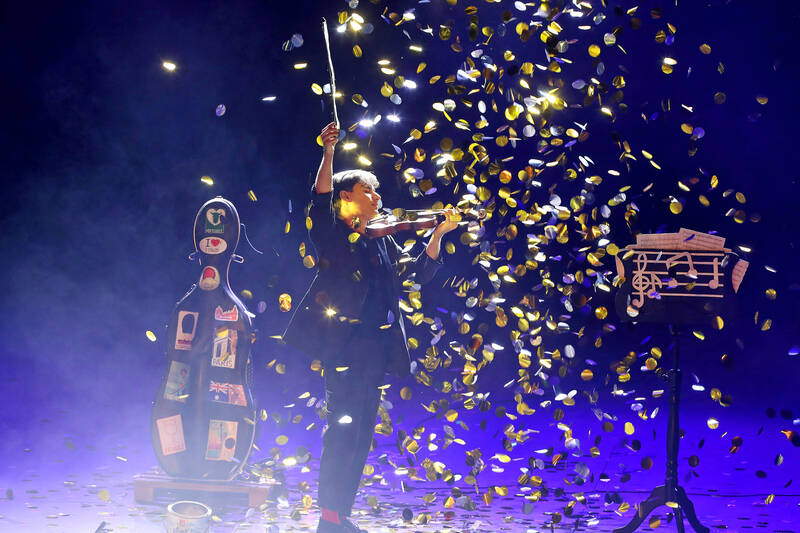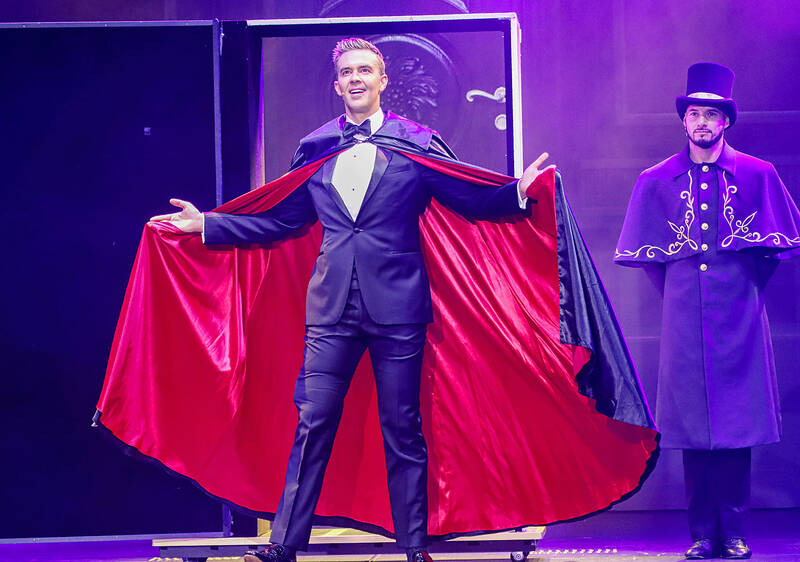The fool is wise. The clown is sad. The trickster is honest. These may be cliches, but there is a truth to them. Artists who excel in their field often thrive on contradiction; indeed, their art seems to depend on it. To know what you are, you need to know what you are not. This sense of conflict and tension, of two opposites being true simultaneously, is often where great art is born.
The strangest of all the artists may be the magician. Their art can encompass comedy, dance and drama; but there is another dimension to them. They are not quite of this world — the essence of their art is that it violates natural law. Part of what they conjure is a fleeting sense of madness, as they show us things that cannot happen. And yet, of all the artists, it transpires that it is magicians who tend to have the healthiest mind, the firmest grasp of reality.
Psychologists at Aberystwyth University reported this week that magicians may be less prone to mental health difficulties than those who work in other art forms. In fact, they go further: the magicians they studied were less likely to experience phenomena such as hallucinations and cognitive disorganization than the general population.

Photo: EPA-EFE
Just as there may be many possible ways to perform an illusion, there are many possible reasons why this may be the case. The magician Sara Crasson suggests a few: that many children turn to magic to confound bullies and build confidence (Paul Daniels, for one, suffered from crushingly low self-esteem in his early years); that the craft requires great deliberation and clarity of thought; that magicians tend to form communities offering support and encouragement.
And to be a magician is typically to be a student of magic: they are likely to know much about the history of the art form and to have a sense of their place within it. But perhaps there are deeper reasons, too, relating to the very nature of their art.
It can be asserted with some confidence that the magician knows reality better than anyone. The magician needs a keen understanding of the boundaries of possibility. They need to know what cannot be done in order to do it. They must appreciate the human capacity for belief, and the methods by which that capacity can be exploited. The magician must also know wonder; they must have felt it themselves, and want to share that feeling.

Photo: AP
The magician knows their own limitations. The magician knows that they cannot do magic. So does their audience. So a sophisticated and elaborate kind of theater is conjured into being: a realm of honest dishonesty.
The audience is paying to be fooled by a professional deceiver, and this arrangement pleases everyone concerned. The audience simultaneously desires to know the secret and fears that same knowledge, because knowing the secret destroys all illusion.
This may be why some of the greatest magicians have also been some of the greatest skeptics. John Nevil Maskelyne, one of the leading stage acts in Victorian times, discredited the claims of conjurors who claimed mystical powers, and exposed at least one fraudulent medium. Harry Houdini was an assiduous debunker of bogus mystics. More recently, Penn & Teller have made skepticism fundamental to their work.
James Randi devoted much of his life to disproving claims of supernatural powers; he was particularly alert to the credulity of scientists, whom he believed were far easier to con than magicians. Those who know the ways of the conjuror know how they might be used to take advantage of the unwary.
Of course, magicians come in various forms. There are the pure entertainers, be they from the typically British patter tradition of Daniels, or the grand illusionists more associated with the US; these do not claim to be any more than skilled performers (when David Copperfield makes the moon disappear in February, as he has promised, no one will believe it has actually ceased to exist).
Then there are the more ambiguous kinds, such as David Blaine, or, to some extent, Derren Brown, or the late master, David Berglas, whose personas convey a sense of enigma, and whose audiences could sometimes seem to be under a kind of spell.
There are still those who say they work genuine miracles. There are magicians who imagine, invent, push the frontiers of the possible; there are magicians who refine the work of others, or who seek merely to repeat it. The study notes that “many magicians perform familiar tricks or variations of them without feeling the need to innovate,” putting them at odds with other creative types. It would be interesting to know how each kind of magician might fare in the university’s research.
But ultimately, the magic of the magician requires a rootedness in the real. This is not to say that magicians never struggle with their mental health — and we may be aware of some particularly tragic examples. But knowing the real from the illusory or delusory, while also celebrating wonder, sounds like as sensible a way to stay mentally healthy as any job provides.
Medical professionals say there are five steps to mental wellbeing: connect with other people; be physically active; learn new skills; give to others; and pay attention to the current moment. That, and so much more, is the life of the magician, those strange people who may have found the secret to an extraordinary normality.

On April 26, The Lancet published a letter from two doctors at Taichung-based China Medical University Hospital (CMUH) warning that “Taiwan’s Health Care System is on the Brink of Collapse.” The authors said that “Years of policy inaction and mismanagement of resources have led to the National Health Insurance system operating under unsustainable conditions.” The pushback was immediate. Errors in the paper were quickly identified and publicized, to discredit the authors (the hospital apologized). CNA reported that CMUH said the letter described Taiwan in 2021 as having 62 nurses per 10,000 people, when the correct number was 78 nurses per 10,000

As we live longer, our risk of cognitive impairment is increasing. How can we delay the onset of symptoms? Do we have to give up every indulgence or can small changes make a difference? We asked neurologists for tips on how to keep our brains healthy for life. TAKE CARE OF YOUR HEALTH “All of the sensible things that apply to bodily health apply to brain health,” says Suzanne O’Sullivan, a consultant in neurology at the National Hospital for Neurology and Neurosurgery in London, and the author of The Age of Diagnosis. “When you’re 20, you can get away with absolute

May 5 to May 11 What started out as friction between Taiwanese students at Taichung First High School and a Japanese head cook escalated dramatically over the first two weeks of May 1927. It began on April 30 when the cook’s wife knew that lotus starch used in that night’s dinner had rat feces in it, but failed to inform staff until the meal was already prepared. The students believed that her silence was intentional, and filed a complaint. The school’s Japanese administrators sided with the cook’s family, dismissing the students as troublemakers and clamping down on their freedoms — with

As Donald Trump’s executive order in March led to the shuttering of Voice of America (VOA) — the global broadcaster whose roots date back to the fight against Nazi propaganda — he quickly attracted support from figures not used to aligning themselves with any US administration. Trump had ordered the US Agency for Global Media, the federal agency that funds VOA and other groups promoting independent journalism overseas, to be “eliminated to the maximum extent consistent with applicable law.” The decision suddenly halted programming in 49 languages to more than 425 million people. In Moscow, Margarita Simonyan, the hardline editor-in-chief of the